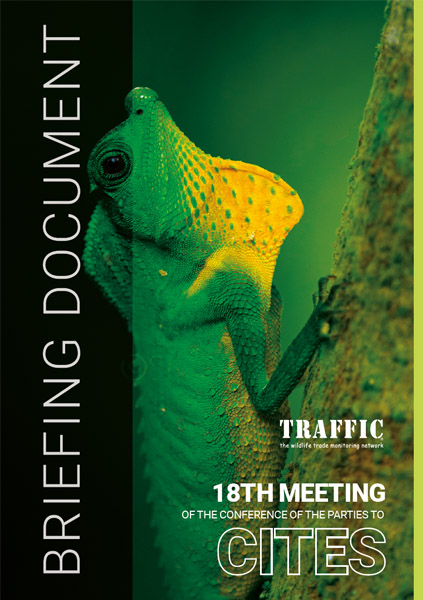TRAFFIC publishes its recommendations and advice ahead of CITES CoP18
6th August 2019, Cambridge, UK—TRAFFIC has published a briefing document covering its recommendations and advice on priority issues under consideration at the 18th Meeting of the Conference of the Parties to CITES, taking place in Geneva next week.

CITES, the Convention on the International Trade in Endangered Species of Wild Fauna and Flora, is the world’s principle international agreement regulating the trade in wild species of animals and plants. 183 Parties are current signatories.
In May this year, a landmark new report from the Intergovernmental Science-Policy Platform on Biodiversity and Ecosystem Services (IPBES) provided overwhelming evidence that nature is declining globally at rates unprecedented in human history, eroding the very foundations of our economies, livelihoods, food security, health and quality of life worldwide.
With 1 million animal and plant species now threatened with extinction, and with the rate of species extinction continuing to accelerate, the catastrophic consequences of poaching, illegal wildlife trade, and unsustainable consumption are already being felt by communities and ecosystems the world over.
CITES member governments and other CoP18 participants face an enormously packed agenda, and will take on a huge degree of responsibility to help develop the appropriate mechanisms and regulation that could rebalance wildlife trade away from conservation threat and towards sustainable levels.
This year’s agenda includes a large volume of ongoing business related to previous decisions and a range of new topics of concern, such as the songbird trade, the trade in big cats, new trade measures for guitarfishes, wedgefishes and mako sharks, and proposed new approaches to deal with intractable issues such as stockpiles and the role of rural communities in CITES decision-making. The agenda also includes more strategic topics, including items that call for a comprehensive review of the Convention to enhance its impact and effectiveness.
TRAFFIC’s CoP18 Briefing Document outlines our views and advice on priority issues and proposals on the agenda. We believe that policy decisions and recommendation should be informed and guided by credible evidence and impartial analysis and, for many of the issues addressed in this document, we have highlighted recent TRAFFIC reports and other research that could assist Parties in their deliberations.
We have also drawn on the extensive Analyses conducted with IUCN to outline our position on the proposals to amend the CITES Appendices and present a summary of how and why we have reached our recommended actions.
We have entered uncharted territory as custodians of the natural world. Next week’s CITES CoP presents a critical opportunity to address the plethora of issues facing wildlife species in trade, and the communities that depend on them. We hope that our evidence-based recommendations and advice helps ensure that trade in wild plants and animals remains at sustainable levels, and that sustainable use of wildlife continues to provide benefits to conservation and human livelihoods.”
Steven Broad, Executive Director of TRAFFIC
CITES CoP18 runs between the 17th and 28th August in Geneva, Switzerland. Members of TRAFFIC’s team of wildlife trade specialists from our offices around the world will attend the CoP and will be available throughout the meeting to provide explanation and further advice on request.




